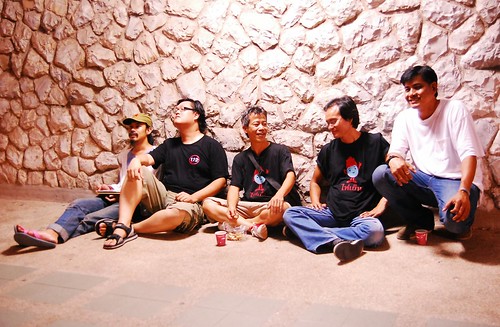Thai authorities have requested Lao PDR to extradite a group of five to six Thais for producing radio programmes deemed defamatory to the Thai Monarchy, even though this would be forbidden under the extradition treaty.
 National Security Council (NSC) Secretary-General, Gen Thawip Netniyom said that the issue will be discussed with the Ministry of Public Security when he visits Vientiane in the near future.
National Security Council (NSC) Secretary-General, Gen Thawip Netniyom said that the issue will be discussed with the Ministry of Public Security when he visits Vientiane in the near future.
Shortly after a meeting on Thai-Lao border security on 26 January, Defence Minister Gen Prawit Wongsuwan said “[We] have consulted with the Lao Defence Ministry about the movement of certain Thai political groups in Lao who use radio to disseminate content affecting Thai national security.”

Thailand and Lao to bypass the law?
While the country is still in mourning for the late King Bhumibol Adulyadej, the government has made requests to at least seven countries to extradite a total of 19 suspects accused of lèse majesté. However, no country has cooperated.
Bangkok Post reported that The Associated Press said that Maj Gen Kongcheep Tantrawanich, spokesperson of the Defence Ministry, said "They are not suspects, they are dangerous people."
"This is more of an exchange of prisoners between one country and another," he said. "They have some and we have some. We are exchanging information and we will see what we get out of it."
The Thailand-Lao extradition treaty was signed in 1999 and came into force in 2000. In 2002, members of a Lao resistance group raided a checkpoint at Vangtao-Chongmek along the border with Thailand to demonstrate their opposition to the communist government and were arrested by the Thai authorities. Two years later, Thailand extradited the Lao involved in the incident.
At the time, Thailand was seen a willing to maintain relationships with its neighbour based on reciprocity; after arresting members of a Lao resistance group and extraditing them to Lao, Thailand would be able to request Lao to act in a similar way in the future. Such cooperation is based on principles of mutual cooperation but without compromising the laws of Lao PDR.
The Bangkok Post reported Thawip as saying "although Thailand and Lao do not have an official agreement to extradite suspects, we can proceed in terms of mutually beneficial cooperation. If Lao wants a criminal who violated the law in Laos and is hiding in Thailand, they may ask Thai officials to make an arrest and send that person back."
Indeed, neither country is allowed to extradite people for political offences or crimes that do not exist in the resident country under the current 1999 extradition treaty. The Nation reported that ‘although insulting the monarchy is not a crime in Laos, Thawip said he would make the request on the basis of reciprocity. “If Laos wants any fugitives who fled prosecution to Thailand, we would arrest and hand them over in exchange [for Thai dissidents]”’.
The Thai authorities have been accused of abusing the lèse majesté law by applying it to political dissent. Furthermore, the Thai authorities risk being charged with hypocrisy; they request neighbouring countries to extradite political offenders while Thai law states that the country may refuse to extradite when the offense is strictly political in nature.
The Nation argued ‘Exploiting the monarchy’s high status in society, authorities enforce lèse majesté as if the country were still ruled by an absolute monarchy.’
Some parallels could be drawn with the case of Hong Kong political activist Joshua Wong, who last October was denied entry into Thailand and detained at Bangkok's Suvarnabhumi airport. As one of the leaders of the umbrella revolution in 2014, he was invited to give a speech at Chulalongkorn University in commemoration of 40th anniversary of the October 6 Thammasat massacre.

A case dating back to two years ago
After the 2014 coup d’état, many political dissidents wanted by the junta — most of them members of the anti-establishment red-shirt movement — fled to neighbouring Lao. Half a dozen have been identified as disseminating criticism of the junta and the monarchy via the internet, especially YouTube.
One week after the passing of King Bhumibol Adulyadej, telecommunications firms in the country were urged by the National Broadcasting and Telecommunications Commission - the kingdom’s broadcasting regulator - to send instructions to customers to monitor and report any “inappropriate content about the royal institution” that they observe on media platforms such as Facebook or YouTube.
Faiyen Channel, Yammy Revolution and even Media Force were among the programmes disseminated red-shirt groups. Last year, following requests from Thai authorities, the Lao authorities have urged Thai dissidents to remain silent while their country is mourning the late King. The Nation reported that ‘some YouTube channels such as Media Force disappeared early last year, according to a viewer who closely monitors dissident programmes’.

Members of ‘Faiyen’ music band are one of the refugees who fled Thailand to ‘a neighboring country’ after the coup 2014.

